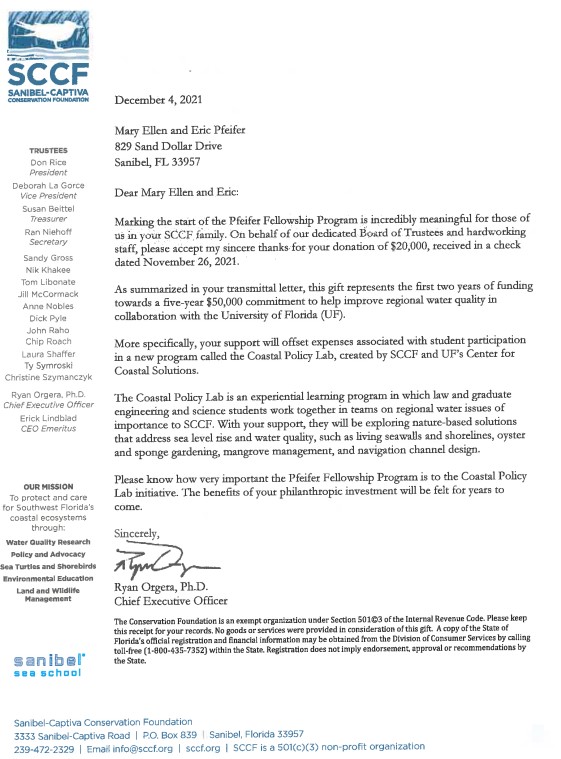Pfeifer Fellowship Supports SCCF and UF Collaborative Research
Last Updated: September 15, 2023
On April 30th, 2021, the Sanibel Captiva Conservation Foundation (SCCF) and the University of Florida's recently formed Center for Coastal Solutions (CCS) announced their collaborative efforts to tackle complex water quality issues in Southwest Florida.
Passionate about water quality, nature, and conservation, Eric and Mary Ellen Pfeifer approached Ryan Orgera, CEO of SCCF with a desire to support a worthy project that will measurably improve the Sanibel Captiva coastal environment. The Pfeifer's have been avid supporters of the organization since 2008 and wanted to do more. "When Ryan called us with the news that SCCF and CCS were combining efforts and expressed the need for ongoing grant funding, it was a perfect match for our us" Eric Pfeifer stated. "In fact, my wife's background in Biology and Biochemistry and a life-long love of Sanibel Island made this an exciting endeavor for us to fund. We are thrilled to be in a position to do this", continued Eric. Over the next five years, Eric and Mary Ellen Pfeifer, owners of Pfeifer Realty Group on Sanibel Island have committed to funding $50,000, $10,000 a year for 5 years in research grants. These grants will be awarded to graduate-level UF students to help support local research here on Sanibel and Captiva Islands. Grant recipients will deliver a public summary of their completed research before returning to the University.
Christine Angelini, an environmental science professor at the University of Florida and director of UF's Center for Coastal Solutions, a newly formed program focused on decreasing the pollutants in fragile coastal environments is poised to address this complex issue. Coastal environments are under constant assault from many directions including nitrogen loading from excess fertilizers, livestock run-off miles upriver, leaking septic fields, poor sewage treatment facility practices, highway runoff, increased housing developments, and expanding highway construction.
Sanibel and Captiva's surrounding waters are the ideal place to launch this complex research. SCCF's advanced River Estuary Coastal Observing Network (RECON) collects real-time data on salinity, temperature, and dissolved oxygen levels throughout the Caloosahatchee watershed and Pine Island Estuary. SCCF's RECON will be the backbone for the UF CCS pilot project. Southwest Florida's estuary will be the epicenter and flagship pilot project for international research into advanced water quality monitoring. Eric Milbrandt, SCCF's Marine Lab Director, and Marine Biologist acknowledges that UF provides resources and technology that the local non-profit can't reproduce.
CCS uses the Comprehensive Coastal Observing Network (CompCON) which can generate 3-dimensional maps that can display water quality issues over time. Their access to one of the world's largest supercomputers and Artificial Intelligence (AI) SCCF and CCS hope that their data collection will be able to inform local water quality decision-makers so they can make policy changes that benefit coastal environments. CCS will use SAS Viya (a cloud-based, in-memory analytics engine that provides quick accurate, and reliable analytics and insights. This comprehensive data platform will aggregate, analyze and visualize environmental data from different times and locations to solve coastal water problems.
Solving water quality issues falls on each one of us. We all must do our part. Together, we can make a difference for future generations.

April 15th, 2022 Update:
The University of Florida's Center for Coastal Solutions just released a study with two nonprofit research partners that shows clear ties between nitrogen from human activities and the longevity and severity of the harmful algal blooms. The report titled “Nitrogen-enriched discharges from a highly managed watershed intensify red tide (Karenia Brevis) blooms in southwest Florida.“, has two key findings:
- “Caloosahatchee River discharges and nitrogen inputs systematically intensify algal blooms"
- “Anthropogenic influence extends upstream to Lake Okeechobee and the Kissimmee basin.”
Miles Medina, the lead author of the study is a research scientist at UF's Center for Coastal Solutions and coauthor Dave Tamasko is the director of the Sarasota Bay Estuary Program. Their work has linked intensified algal blooms to the harmful discharges into the Gulf that start at the Kissimmee River basin, flow into Lake Okeechobee, down the Caloosahatchee River basin into the estuary. SCCF's Marine Lab is the leading source of scientific data that researchers use to monitor water quality over long periods of time.
Daniel Andrews, one of the founders of Captains for Clean Water draws a creative analogy. Until there was scientific proof that cigarette smoke caused cancer, tobacco companies continued to deny the correlation.
Study Translated: dumping nutrients into the ocean will result in a bumper crop of Karenia Brevis
September 15th, 2023 Update:
Hurricane Ian left behind catastrophic property damage in Southwest Florida — but did mangroves and coastal dunes lessen the impact? The Sanibel-Captiva Conservation Foundation (SCCF) wants to learn more about how much damage may have been reduced where coastal property owners' and renters' homes and businesses were protected by mangroves or coastal dunes. We've created a short survey for those who rent or own property close to the shoreline. The survey should not take more than 10 minutes to complete.
As part of the survey, we ask that you recount in your own words how you view the role mangroves or dunes played in relation to the damage your property sustained from the hurricane. (Note: If you choose to skip this question, your answers to all other survey questions will be recorded when you click "submit").
Please forward this survey to anyone you know who owns or rents property near a shoreline protected by fringing mangroves or coastal dunes and was impacted by Hurricane Ian.
The survey will remain open through Sept. 28. SCCF Pfeifer Conservation Fellow Thomas Ankersen will be writing a short policy brief highlighting the role of mangroves as storm protection that will include these results.